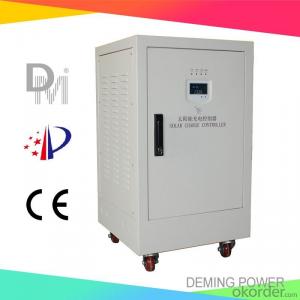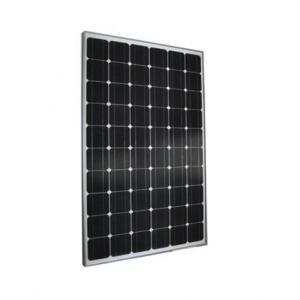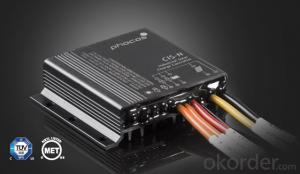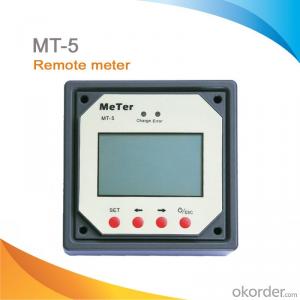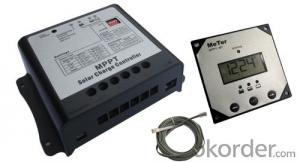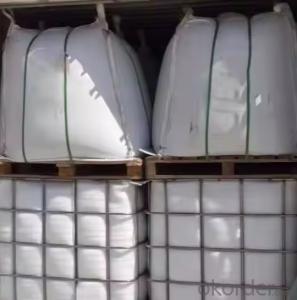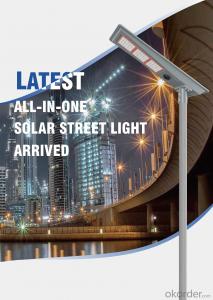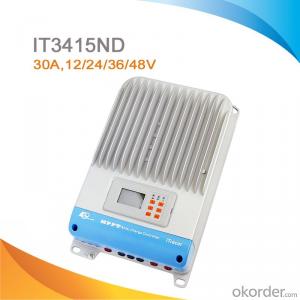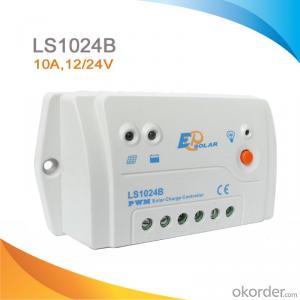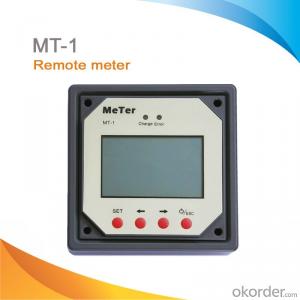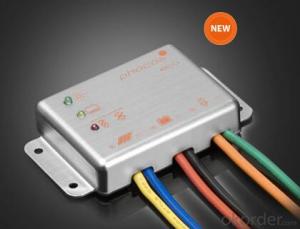MPPT Solar Charge Controller 96V 200A with best price for solar power system
- Loading Port:
- Qingdao
- Payment Terms:
- TT OR LC
- Min Order Qty:
- 1 PCS
- Supply Capability:
- 500 PCS/month
OKorder Service Pledge
OKorder Financial Service
You Might Also Like
Properties of the solar charge controller
1. Design for off-grid solar power system.
2. Applicable to different kinds of batteries.
3. Adopts MPPT technology (Maximum Power Point Tracking). The advanced tracking algorithm make the solar module operate at ideal voltage which the solar modules can produce the maximum available power.
4. Modular design with simple structure and easy maintenance.
5. Automatic power control function.
6. LCD display: Solar panel current, solar panel voltage, solar panel power, battery group voltage, charge current.
7. Perfect protection function: Solar reverse charge protection, Solar reverse connection protection, Battery reverse connection protection, Battery overcharge protection, Battery over current protection etc ,thus the system has higher reliability.
Technical parameters of the solar charge controller
Model | 96V200A | |||||
Battery group rated voltage | 96Vdc | |||||
PV Rated current | 200A | |||||
PV open circuit voltage | 400V | |||||
PV Max. power | 19200Wp | |||||
Input PV module road number | 1 | |||||
Function | MPPT charge mode, auto stop charge, auto recharge voltage; Protection: connecting contrary, over current, short circuit, over heat etc. | |||||
Display mode | LCD | |||||
Display content | solar panel voltage, solar panel current, solar panel power, battery voltage, charge current | |||||
MPPT DC voltage range | 80-116Vdc | |||||
Floating Charge Voltage (adjustable) | 110Vdc | |||||
Stop charge voltage | 116Vdc±1% | |||||
Recharge voltage | 108V±1% | |||||
Voltage drop between PV and battery | 1.5V | |||||
Max itself power consumption | 100mA-150mA | |||||
Work environment temperature | -30-60°C | |||||
Relative humidity | 90% No condensation | |||||
Applicable altitude | 3000m The rated power should be reduced when it is higher than 2000m | |||||
Noise (1m) | 40dB | |||||
Degree of protection | IP20(Indoor) | |||||
Cooling method | Forced air cooling | |||||
*Communication interface (optional) | RS485/USB/GPRS/Ethernet | |||||
*Temperature compensation(optional) | -4mv/°C/2V,-35°C~+80°C,Accuracy:±1°C | |||||
Product size (mm) | 900*500*500mm | |||||
Product Weight(kg) | 50kg | |||||
*Above parameter only for reference. Could be custom made to user specifications.
- Q:How does a solar controller protect batteries from overcharging?
- A solar controller protects batteries from overcharging by monitoring the voltage of the batteries and regulating the flow of energy from the solar panels. When the batteries are fully charged, the controller automatically reduces or stops the charging process to prevent overcharging, which can cause damage and reduce the lifespan of the batteries.
- Q:Are solar controllers weatherproof?
- Yes, solar controllers are typically designed to be weatherproof. They are built with durable materials and sealed to protect against various weather conditions such as rain, snow, and extreme temperatures. This ensures their functionality and longevity in outdoor environments.
- Q:What is the maximum load current a solar controller can handle?
- The maximum load current a solar controller can handle depends on the specific model and its specifications. It can range from a few amps to several hundred amps, depending on the capacity and design of the controller.
- Q:Can a solar controller be used with solar-powered indoor government buildings?
- Yes, a solar controller can be used with solar-powered indoor government buildings. A solar controller, also known as a charge controller, is an essential component of a solar power system. Its primary function is to regulate the flow of electricity between the solar panels and the batteries, ensuring that the batteries are charged efficiently and preventing overcharging or damage to the batteries. Solar-powered indoor government buildings typically utilize solar panels to generate electricity from sunlight. This electricity is then used to power various devices and systems within the building. In such cases, a solar controller is necessary to manage the charging process of the batteries that store the solar energy. By connecting the solar panels to the solar controller and then to the batteries, the solar controller can accurately monitor and control the charging process, maximizing the efficiency and lifespan of the batteries. Additionally, solar controllers often provide other useful functionalities, such as temperature compensation, load control, and battery protection. These features are particularly important for indoor government buildings, as they help optimize the performance of the solar power system and ensure reliable and sustainable power supply. Therefore, it is highly recommended to use a solar controller in conjunction with solar-powered indoor government buildings to ensure efficient and safe operation of the solar power system.
- Q:I bought a solar panel controller, the instructions I was thrown, and later found the model all in the manual, a total of 0 to 29 these models, do not know the meaning of the model. Does anyone know?
- This situation is best to contact the manufacturers, generally have PDF version of the manual. You can contact the manufacturer to an electronic version of the manual.
- Q:Can a solar controller be used with a solar-powered water heater?
- Yes, a solar controller can be used with a solar-powered water heater. A solar controller helps regulate the flow of energy from the solar panels to the water heater, ensuring optimal heating and preventing overcharging or overheating. It helps maintain the efficiency and performance of the water heating system by controlling the temperature and timing of the water circulation.
- Q:Can a solar controller be used with solar panel ground fault detection systems?
- Solar panel ground fault detection systems can indeed be used in conjunction with a solar controller. The solar controller's main responsibility is to regulate the voltage and current flow from the solar panels to either the battery or the grid. It ensures that the solar panels are functioning at their highest level of efficiency and keeps track of the charging process. On the other hand, a ground fault detection system is specifically designed to identify any ground faults or leakage currents within the solar panel system. It continually monitors the electrical connections and detects any irregularities that may pose a safety hazard. Typically, the solar controller and ground fault detection system operate independently from one another. The solar controller focuses primarily on optimizing energy production and storage, while the ground fault detection system prioritizes the system's safety. However, it is possible to integrate these two systems. Some advanced solar controllers have the capability to identify ground faults internally, or they can be connected to an external ground fault detection system. This integration allows for more comprehensive monitoring and protection of the solar panel system. In conclusion, although the solar controller and ground fault detection system have different functions, they can be used together to improve the overall performance and safety of a solar panel system.
- Q:What is the maximum load voltage that a solar controller can handle?
- The maximum load voltage that a solar controller can handle depends on the specific model and its design specifications. It is important to consult the manufacturer's documentation or specifications for accurate information on the maximum load voltage capacity of a particular solar controller.
- Q:Can a solar controller be used with solar-powered refrigeration systems?
- Yes, a solar controller can be used with solar-powered refrigeration systems. A solar controller is a device that regulates the voltage and current coming from solar panels to ensure the efficient charging and discharging of batteries. It helps to maximize the performance of the solar panels and protect the batteries from overcharging or discharging. In a solar-powered refrigeration system, the solar controller can be used to manage the power flow from the solar panels to the batteries that store the energy. It ensures that the batteries are charged properly during daylight hours and that the refrigeration system operates efficiently when the sun is not shining. By using a solar controller, solar-powered refrigeration systems can effectively harness solar energy and provide reliable cooling without relying on the grid or fossil fuels.
- Q:Can a solar controller be used with a solar-powered billboard or signage?
- Yes, a solar controller can be used with a solar-powered billboard or signage. A solar controller is used to regulate and optimize the charging and discharging of batteries in a solar power system. In the case of a solar-powered billboard or signage, the solar controller helps to manage the flow of electricity from the solar panels to the batteries, ensuring efficient and reliable power supply for the signage.
1. Manufacturer Overview |
|
|---|---|
| Location | |
| Year Established | |
| Annual Output Value | |
| Main Markets | |
| Company Certifications | |
2. Manufacturer Certificates |
|
|---|---|
| a) Certification Name | |
| Range | |
| Reference | |
| Validity Period | |
3. Manufacturer Capability |
|
|---|---|
| a)Trade Capacity | |
| Nearest Port | |
| Export Percentage | |
| No.of Employees in Trade Department | |
| Language Spoken: | |
| b)Factory Information | |
| Factory Size: | |
| No. of Production Lines | |
| Contract Manufacturing | |
| Product Price Range | |
Send your message to us
MPPT Solar Charge Controller 96V 200A with best price for solar power system
- Loading Port:
- Qingdao
- Payment Terms:
- TT OR LC
- Min Order Qty:
- 1 PCS
- Supply Capability:
- 500 PCS/month
OKorder Service Pledge
OKorder Financial Service
Similar products
New products
Hot products
Hot Searches
Related keywords
